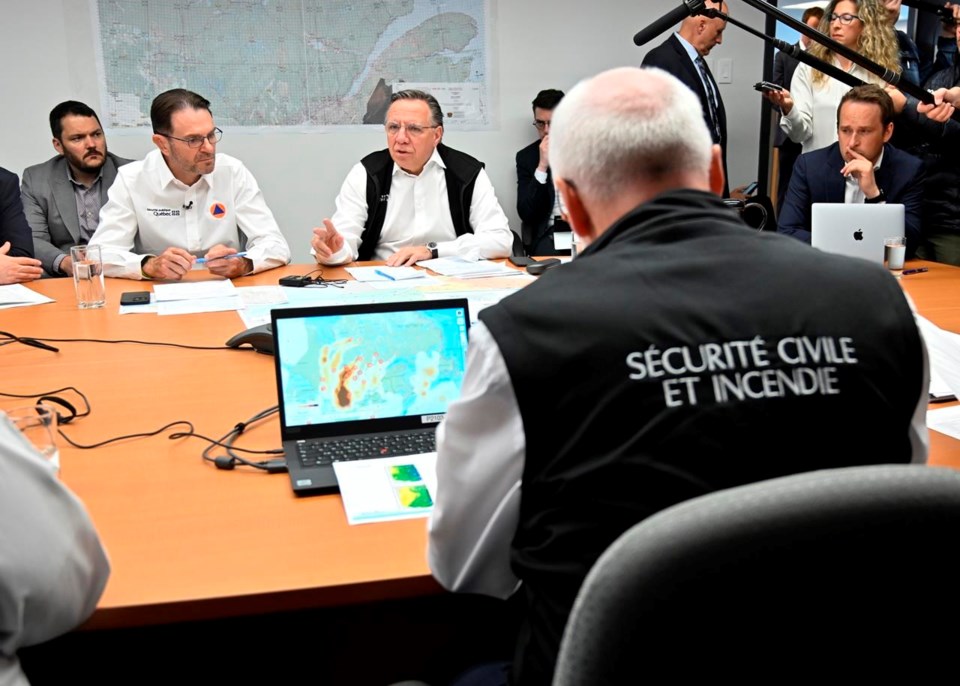MONTREAL — Quebec's precarious wildfire situation is expected to remain stable over the next 48 hours but residents displaced by the raging forest fires likely won't be able to return home until early next week, Premier François Legault said Thursday.
"We have (as of) today, 13,500 people that have been evacuated, we think that it'll be stable in the next few days," Legault told a briefing, but said that evacuees from Chibougamau and Lebel-sur-Quévillon, Que., which account for a large number of those displaced, won't be able to return until Tuesday at the earliest.
Quebec's wildfire fight was focused Thursday in the province's northern and western regions, where flames had reached the doorstep of a municipality of roughly 800 people. Authorities said a wildfire was within 500 metres of Normétal, Que., located 720 kilometres northwest of Montreal, in the Abitibi region.
The province's forest fire prevention agency — Société de protection des forêts contre le feu (SOPFEU) — said it was confident the small community could be protected, with winds less strong than first feared.
Seven aircraft had been working in the area to reduce the pace of that fire.
"As of yesterday, it was at about 1,500 metres from the community and it has gotten closer very slowly all the day," said Sylvain Tremblay, a SOPFEU official. "But it was a slow burn and we managed to to make some drops with the bombers to slow the fire even more so."
Tremblay said although some parts of the fire are close to the community, it remained stable.
The government was also focusing efforts on Lebel-sur-Quévillon, Que., a northern municipality where 2,100 people were evacuated and where two separate large fires risked merging. A wildfire was located about 15 kilometres outside of town.
Meanwhile in a pair of Cree communities, authorities were monitoring the situation closely.
The Cree community of Mistissini, population 4,000, remained on alert but had not been evacuated. Legault said there was a risk the only road out of that community, located 550 kilometres north of Montreal, could be cut off, but said a threshold to evacuate had not been met, as previously thought.
Legault said there was a misunderstanding over the situation a day earlier, which led to a refusal from the community to evacuate. The premier said he accepted the local chief's decision not to evacuate and the situation is under surveillance.
In another nearby Cree community of Waswanipi, west of Chibougamau, some people were relocated to the Quebec City area as a precaution, primarily due to fears over road access and heavy smoke.
About 15 kilometres outside of Chibougamau, a wildfire had stabilized, authorities said. Authorities were building 40-metre wide trenches to stop the fire from reaching residences in the community, which was evacuated on Tuesday at the same time as Oujé-Bougoumou, a Cree community of 800.
Earlier, Quebec's public security minister preached patience.
There have been no reports of injuries or deaths, or damage to homes from the 146 wildfires burning across the province, Public Security Minister François Bonnardel told reporters in Roberval, Que., about 250 kilometres north of Quebec City. He did not have a count of how many hunting cabins or forestry equipment were engulfed.
There were also no additional evacuations on the horizon, but no rain was expected until next week and temperatures across the province were expected to rise, he said.
"Some fires are under control, some not," Bonnardel said. "We're looking at these fires every hour, we're hoping to tell Quebecers they will be able to go back home, but in the short term, it won't be possible."
Chibougamau Mayor Manon Cyr thanked the city of Roberval for offering shelter to residents from her town. Many evacuees from various Quebec communities have been sent there and to neighbouring municipalities.
Cyr said she has told Chibougamau residents to be calm despite the uncertainty.
"I tell them to be like me — Zen and patient. That's the most important," Cyr said, joking that she had done a type of rain dance to bring about much-needed precipitation to the region.
"But seriously, that's what we are (hoping) for, you know, until we have good quantity of rain … that's going to be the solution."
Quebec was expecting reinforcements from abroad to help the 620 firefighters on the ground -- a combination of SOPFEU staff and Canadian Forces soldiers.
Firefighters from France and the province of New Brunswick are being brought in and authorities expect other firefighters from Portugal, Spain, and Mexico to join them.
Authorities weren't able to say Thursday whether any of the firefighters coming from the United States, announced Wednesday, would be deployed to Quebec as well.
On Thursday, U.S. President Joe Biden said in a statement that his country was ready to help Canada accelerate its wildfire fight, as fires in Quebec and Ontario send plumes of smoke towards U.S. cities.
So far more than 645,000 hectares have burned in the province, representing the worst fire season on record.
This report by The Canadian Press was first published June 8, 2023.
Sidhartha Banerjee, The Canadian Press



